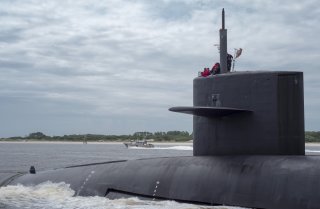Seven Deadly Misconceptions About Nuclear Deterrence
U.S. nuclear deterrence policy, in the broadest sense, is virtually unchanged since the Kennedy years.
A seventh misconception is that the United States believes in fighting a nuclear war. This is one of those false ideas the disarmament community has been spreading for decades. They bolster this claim by pointing to the fact that for decades we have developed “limited options” in the event deterrence fails. No serious U.S. policymaker in recent memory has believed that a nuclear war could be controlled. Indeed, the risk of the military using a small number of nuclear weapons, which could escalate into an all-out civilization-destroying exchange, is one of the great deterrents to any leader contemplating nuclear or conventional aggression against the United States or its allies. The whole point of U.S. nuclear policy is to prevent the outbreak of war among the major powers. The United States’ limited options strengthen this policy objective in two ways:
First, because potential enemy leaderships clearly have multiple nuclear options, it is essential that the United States maintain a flexible set of alternatives so that those leaderships understand that it has a credible counter to whatever they have developed and thereby can deter them from resorting to such options.
Second, in the event that nuclear deterrence was to fail initially, then it would be incumbent on a president to seek to halt the amount of violence and destruction at the lowest possible level.
“Our basic strategy, in direct support of our policy of deterrence has been, and remains, the prevention of any aggression, nuclear or conventional,” Defense Secretary Caspar Weinberger said in testimony in front of the Senate Committee on Foreign Relations in 1982. “But it would be irresponsible—indeed immoral—to reject the possibility that the terrible consequences of a nuclear conflict might be limited if deterrence should fail. To be sure, there is no guarantee that we would be successful in creating such limits. But there is every guarantee that restrictions cannot be achieved if we do not attempt to do so.”
In summary, nuclear deterrence is both very difficult and relatively simple. It is “difficult” to accept that there is no guarantee adversaries of the United States will avoid resorting to nuclear weapons in a crisis, especially since they repeatedly say they will. It is “simple” in the sense that having the capability at any level of nuclear force employment to match the threats of U.S. adversaries is the best guarantee the country can have that adversaries will not seek to use such weapons at any time in any crisis against anyone. However, failure to fully understand the myriad dangerous misconceptions embraced by nuclear critics might very well slide the United States into policies that make securing deterrence very difficult while making it relatively simple for U.S. adversaries to be tempted to recklessly choose to risk Armageddon in the pursuit of their totalitarian and hegemonic objectives.
Franklin Miller is a former senior defense official specializing in nuclear matters in the Department of Defense and White House and is now a Principal at the Scowcroft Group.
Peter Huessy is president of Geo-Strategic Analysis of Potomac, Maryland.
Image: Reuters

